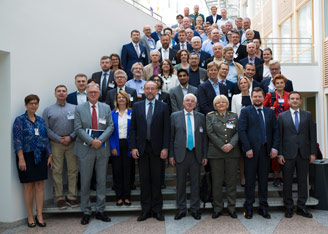Norway strengthens scientific cooperation with NATO partners
Scientists and experts from Norway and NATO partner countries discussed opportunities for practical cooperation to address common emerging security challenges during a Science for Peace and Security (SPS) Programme Information Day held in Oslo on 14 June 2017. Successful cooperation between Norway and NATO’s SPS Programme included activities in the areas of Women, Peace and Security and unexploded ordnance (UXO) detection.

Organised in cooperation with the Norwegian Delegation to NATO and the Norwegian Research Council, the SPS Information Day provided an opportunity to exchange on possibilities for capacity-building and research cooperation with partners in defence and advanced technologies such as cyber defence, unmanned aerial vehicles (UAV) technology and chemical, biological, radiological and nuclear (CBRN) defence.
“Norway has traditionally been a strong partner in the SPS programme,” said Rune Resaland, Head of Department for Security Policy and the High North, Norwegian Ministry of Foreign Affairs. “In the period from 2000 until 2014, Norwegian researchers participated in more than 60 SPS projects. Currently, there is only one project with Norwegian involvement in the SPS. We hope that the SPS Information Day can contribute to more interest for SPS in Norway and sow the seeds for projects between Norwegian researchers and international partners in the future.”
Human and social aspects of security, including civil-military relations, counter-terrorism and the Women, Peace and Security issues were a focus of discussions. Norway recently conducted an SPS research workshop aimed at sharing good practices for handling gender-related complaints in the armed forces, co-organised by the Geneva Centre for the Democratic Control of Armed Forces (DCAF). Experts dealing with gender-related harassment and discrimination engaged in a frank and open discussion and exchanged best practices. Their work resulted in the publication entitled “Gender and Complaints Mechanisms Handbook” to prevent and respond to gender-related discrimination.
Norway is also working with Ukraine on an SPS multi-year project to develop a 3D mine detector. “This project complements other SPS efforts in support of humanitarian demining and forms part of NATO’s Comprehensive Assistance Package for Ukraine that was endorsed at the Warsaw Summit last year,” says Dr Jamie Shea, NATO Deputy Assistant Secretary General for Emerging Security Challenges. Together, these countries aim to design a state-of-the-art digital ground penetrating radar system which will detect dangerous targets such as mines, improvised explosive devices and explosive remnants of war. The device will provide a visual 3D image and automatically recognise the type of the detected object in up to three meters depth. Ultimately, the technology will allow faster, cheaper and safer clearance of former conflict zones and help to avoid victims among civilians and the military.

